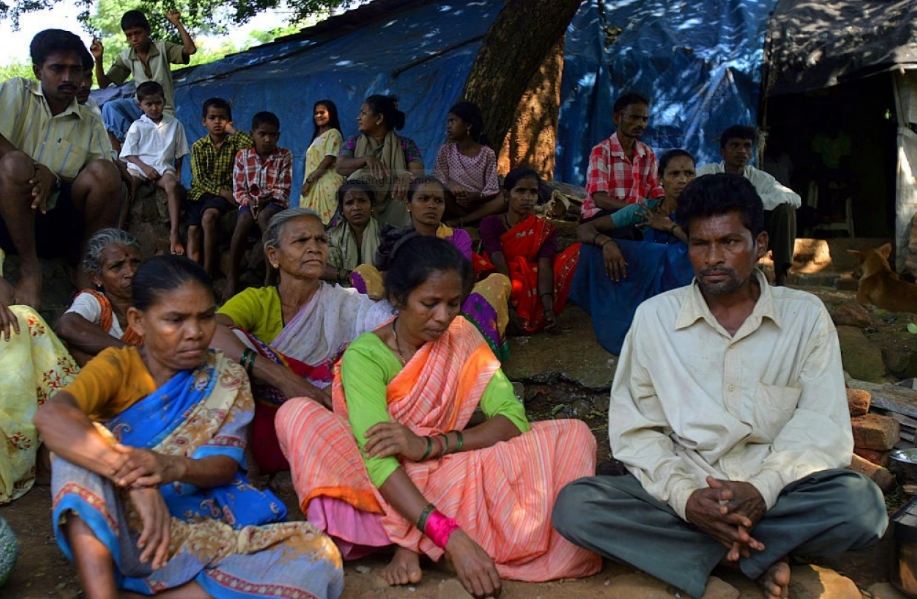A shocking case of bonded labour in its worst, most atrocious form has come to light in the Hassan District of Karnataka. Fifty-two people from the Dalit community including women and children, have been rescued in Savankamahalli village, where they were forcefully kept in a small shed to live in depraved conditions for as long as up to three years. The youngest victims among the enslaved are two 6 year-old boys and of the oldest is one 62 year-old man.
Shocking that members from Dalit & Tribal communities, were enslaved and made to suffer in the most inhuman conditions, but the Congress-JDS govt is busy with cabinet expansion! People are watching.
I urge our karyakartas to help the people in distress. https://t.co/a0MiqGDRq5
— Amit Shah (Modi Ka Parivar) (@AmitShah) December 22, 2018
The police have identified 24 of the people rescued persons belonging to the Dalit community. Most of them are from neighboring districts like Raichur, Chikkamagaluru, Tumakuru, Chitradurga in Karnataka and some were also from Telangana and Andhra Pradesh.
Out of the 52 persons rescued, 32 are men, 16 are women and among the children, one is girl and 3 are boys. The owner of the farm that they worked in was Krishnegowda, and others involved were Basavaraj, Munish, Pradeep and Nagaraju who managed the activity and supervised the labourers. The bonded labourers were beaten with wooden logs and horse whips, and were threatened with violence if they were ever to attempt an escape. They had all seen each other getting beaten up and hence they restrained themselves from speaking up, out of fear and intimidation. The women have also been reported to have been sexually harassed by the perpetrators.
This prolonged atrocity came to light only when one of the victims, Krishnappa, managed to scale a 12 feet tall wall and obeyed his moral compass to end the ordeal for the rest of his inmates, by daring to go to the police. The first thing he did was rush to a village that he knew one of the fellow captives belonged to, and tracked down the relatives of the man to inform them where he had been trapped. He then, along with other villagers went forward to report the crime to the police. About two weeks ago, three other labourers had escaped from the same farm but they did not go to the police.
The perpetrators would hunt for vulnerable migrants who had arrived, in search of work, at railway stations or bus stands. They would be lured by promises of work opportunities and good wages, to agree and come to the farm. They would then be stripped off of their clothing, and their cell-phones, wallets and identity documents would be stolen from them.
They were locked up and supervised at all times, and the adults toiled, everyday, for as long as 19 hours from 3 in the morning to 10 in the night or even longer. They were punished for the slightest of errors. They were not allowed to talk too much amongst each other, not even to their wives and children, speak with outsiders or protest against hardships and torture. The children were not made to work but were confined to the shed all day. In one case, a parent recounted that his crying child was pushed away and got hurt and when the two parents tried to console the child, they were beaten up by the intoxicated supervisor in front of the child.
The captives had been working at a ginger farm at the time of rescue. They would also be loaned to work at neighbouring plantations. The victims received no wages and were threatened, if they erred, with the denial of the three meals they got per day or the occasional supply of liquor that the men got. After rescue, the rehabilitation of the victims has become a problem as they do not have their cell phones and identity documents, nor do they have proper addresses. Some have fresh wounds and cuts while others have marks of older injuries and lashes on their bodies. The police fear that there may be more such cases in the area. Cases of Bonded labour have been seen in other parts of Karnataka as well, including Mandya, where a dalit Tamil woman was reported in September, to have been kidnapped to work at a farm in Bekkalale village. She and her husband had earlier escaped from the same perpetrator.
Such a condemnable event involving the dalit community could easily make international headlines, apart from warranting the unforgiving wrath of the liberal social justice warriors. However, almost a week has gone by since the rescue took place, and the mainstream media and anti-BJP parties are not outraging over this shameful and deplorable revelation. Karnataka is ruled by a Congress-JDS coalition and until May 2018, it was under the rule of the Congress alone. Had a crime of this scale taken place in Uttar Pradesh or Gujarat, all hell would have broken loose on the upper castes of the states and the ruling BJP governments. Yogi’s Uttar Pradesh and Modi’s Gujarat would have been projected, by self-proclaimed liberals, as the most unsafe places to live in India, where the upper castes, led by Brahmins indulge in organised crime to unleash violence against the Dalit and tribals. A mentally ill tribal man was lynched to death in Kerala, his final moments captured in a selfie clicked by the perpetrators, and at that time too, since it happened in a bastion of communists, no outrage against the government was witnessed. It is high time that those who are gifted with the talent of belligerently generalizing in the case of BJP governments, must evoke their powers in the case of atrocities in states like Kerala, West Bengal and Karnataka and demand for the resignations of the respective Chief Ministers.
